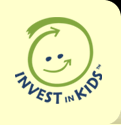Research drives the engine of Invest in Kids. It keeps us on the forefront of knowledge about early child development, helps us identify and support best practices, and gives us the ability to understand the attitudes, behaviours and needs of parents in caring for our youngest children. But most of all, research gives us the means to understand the gaps between science and practice. The Parenting Initiative
With the Parenting Initiative, Invest in Kids is developing and testing an innovative parenting program designed to ensure the best possible start in life for Canada's children by transforming the way parents acquire the skills they need for their most important role - raising a child. This comprehensive multimedia parent education program is for couples expecting their first baby and begins during pregnancy and progresses through their child's 2nd birthday. Features include "just-in-time" content based on parents' interests and needs as their child grows and a combination of face-to-face and on-line delivery mechanisms. The Parenting Initiative is funded, in part, by a grant from The Lawson Foundation. Parenting in the Beginning Years - Priorities for Investment
This report, prepared with support from The Lawson Foundation, reveals that while Canada can be proud of its efforts to improve and protect the physical health of infants and young children, we still have a long way to go to ensure an equal level of promise for our children's social, emotional and intellectual development. Research indicates these areas are inextricably tied to parenting. Yet for new parents, Canada provides only a patchwork of services and supports, which mainly supply limited doses of information. Parent education efforts are primarily targeted to high risk parents, leaving the majority of mainstream parents without supports or resources to help them knowledgeably and confidently fulfill their role. Parent education programs are also largely unevaluated, so little is known about whom they reach and whether they are effective. 
Parent Education - What is Required to Build the Skills Parents Need to Raise Healthy Children
This report, prepared with support from The Lawson Foundation, distils what decades of study tell us about infants, parents and parent education programs that could assist parent educators in building effective programs for new parents. Before their first baby arrives, many of today's parents view parenthood as idyllic. Although the majority do their best to educate themselves after their baby arrives, many come to feel incompetent, unsupported and personally demoralized. Their marital relationships suffer and likewise their parenting. Based on these findings, the report suggests a set of key parameters for modern parent education programs. 
A National Survey of Parents of Young Children
In 1999, Invest in Kids commissioned a survey of 1,643 parents to better understand the context in which young children are being raised in Canada. The survey explored how parents behave toward their children, what parents know about child development and parenting, their confidence in their parenting skills, their emotional well-being and it explored differences across key subgroups of parents. 
The State of Knowledge About Prevention/Early Intervention
Invest in Kids commissioned a worldwide study to evaluate the scientific rigor of over 4, 000 prevention and early intervention studies. This landmark review features the top 34 studies which meet high standards of quality. It is packaged with peer reviews and recommendations for a national approach to evaluating "what works" in intervention models and programs for Canadian families with young children. This document will be of particular interest to policymakers, researchers and program planners planning large-scale early childhood development initiatives. 
| 